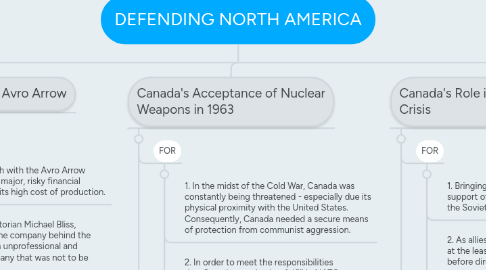
1. The Scrapping of the Avro Arrow
1.1. FOR
1.1.1. 1. Following through with the Avro Arrow would have been a major, risky financial investment due to its high cost of production.
1.1.2. 2. According to historian Michael Bliss, A.V.Row Canada, the company behind the Avro Arrow, was an unprofessional and disorganized company that was not to be trusted.
1.1.3. 3. The Avro Arrow burned fossil fuels, which is harmful to the environment.
1.1.4. 4. Though the Avro Arrow would have been a success if foreign sales were guaranteed, the Avro Arrow was too specifically tailored toward Canada's needs in air travel. Other countries were more focused on supporting their own aircraft industries.
1.2. AGAINST
1.2.1. 1. Many Canadian engineers and other employees lost their jobs when the Avro Arrow was cancelled.
1.2.2. 2. The Avro Arrow was the most advanced fighter plane at the time, which means that the development of this plane would have benefitted Canada's international image.
1.2.3. 3. As many aggressors were clearly imminent during the Cold War, improving Canada's defence system would have been helpful.
1.2.4. 4. The cancellation of the Avro Arrow project ruined Canada's streak in leading the world's military air force during war times.
2. Canada's Acceptance of Nuclear Weapons in 1963
2.1. FOR
2.1.1. 1. In the midst of the Cold War, Canada was constantly being threatened - especially due its physical proximity with the United States. Consequently, Canada needed a secure means of protection from communist aggression.
2.1.2. 2. In order to meet the responsibilities that Canada promised to fulfill in NATO and NORAD, accepting nuclear weapons would have been necessary.
2.1.3. 3. Canada needed to acquire nuclear weapons in order to secure the Bomarc missile agreement with the United States after the cancellation of the Avro Arrow.
2.1.4. 4. Accepting the nuclear weapons would provide a blanket of security over worried Canadians, who felt defenceless and vulnerable during the Cold War.
2.2. AGAINST
2.2.1. 1. Nuclear weapons can be argued as an inhumane, unnecessary way of fighting the war due to its immense impact and countless human deaths.
2.2.2. 2. In the case of an attack on Canada, there are other countries with nuclear weapons who would be willing to support Canada.
2.2.3. 3. As an advocate for disarmament in the United Nations, Canada goes against its own stance by accepting nuclear weapons.
2.2.4. 4. Any use of a nuclear weapons would most likely result in a nuclear war, leading to "global suicide" - mass destruction of the world's population.
3. Canada's Role in the Cuban Missile Crisis
3.1. FOR
3.1.1. 1. Bringing out Canada's military forces in support of the Americans might have triggered the Soviet Union into starting a war.
3.1.2. 2. As allies, the USA should have consulted, or at the least, alerted Canada about the situation before directly intervening in the situation.
3.1.3. 3. Refusing to automatically stand side Americans showed Canada's newfound independence, and proved that Canada is not a country that will simply follow the demands of other countries.
3.1.4. 4. Diefenbaker wanted to take precautionary measures by initiating the "fact-finding" mission before making any rash calls.
3.2. AGAINST
3.2.1. 1. Canada should have been quicker to help the Americans because since the USA and Canada are North American allies in NORAD, they hold the responsibility of always being willing to help allies in need.
3.2.2. 2. During such tense times in world history, Canada needed to be careful not to create too many enemies. Refusing to help the Americans could have been extremely harmful to Canadian-American relations.
3.2.3. 3. An attack on USA would have started a war, which means Canada would have been engaged in war as well. If Canadian forces had immediately responded to America's call for help, Canada's force would already be prepared to fight.
3.2.4. 4. Canadians stand by traits of loyalty and bravery, and by refusing to help the Americans, many Canadians felt as if Diefenbaker had misrepresented the Canadian population.

